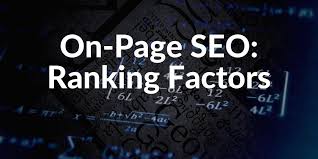
When it comes to on-page SEO, creating high-quality, well-optimized content is essential for improving your search engine rankings. By focusing on certain on-page elements, you can help search engines understand the relevance and value of your content, ultimately leading to better rankings. Here are some key strategies for creating on-page SEO ranked content:
1. Keyword Research:
Start by conducting thorough keyword research to identify the terms and phrases your target audience is searching for. Use tools like Google Keyword Planner, SEMrush, or Ahrefs to discover relevant keywords with a good search volume and manageable competition.
2. Quality Content:
Craft high-quality, relevant, and valuable content that addresses the needs and interests of your target audience. Your content should be well-written, informative, and engaging to keep visitors on your page.
3. On-Page Optimization:
Optimize your content for the target keywords by including them in strategic locations such as the title tag, meta description, headings, and throughout the body content. However, it's important to maintain a natural and reader-friendly flow, avoiding keyword stuffing.
4. User Experience: Ensure that your content provides a positive user experience by using descriptive and engaging titles, clear headings, and relevant images or multimedia. A well-structured and easy-to-navigate page can help improve dwell time and reduce bounce rates, which are important ranking factors.
5. Internal Linking:
Incorporate internal links to relevant pages within your website to guide users to other valuable resources and to help search engines understand the structure and hierarchy of your site.
6. Mobile-Friendly Content:
With the increasing use of mobile devices, it's crucial to ensure that your content is optimized for mobile viewing. Use responsive design and test your content across various devices to ensure a seamless user experience.
7. Page Speed:
Optimize your page speed to provide a fast-loading experience for users. Compress images, leverage browser caching, and minimize HTTP requests to improve loading times, which can positively impact your search rankings.
By implementing these on-page SEO strategies, you can improve the relevance, visibility, and ranking potential of your content, ultimately driving more organic traffic to your website. Keep in mind that SEO is an ongoing process, so regularly monitor and update your content to align with the latest best practices and algorithm updates.